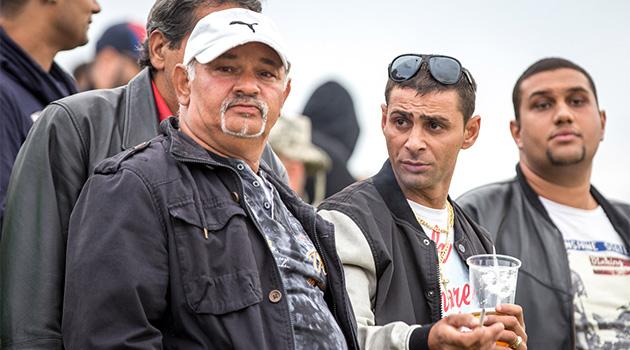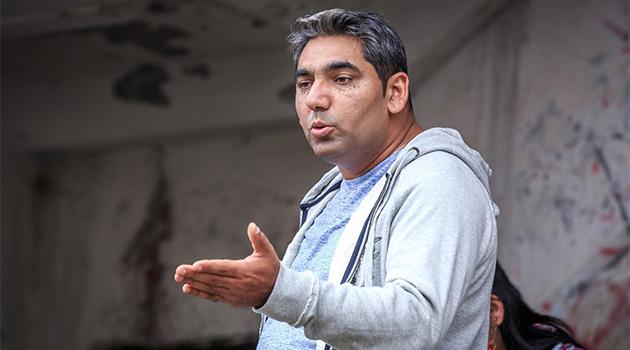Renata Berkyová: Czech sitcom is rocking the Czech-Romani world

The eight episodes of the “Most!” series that Czech Television began broadcasting at the beginning of the year are rocking the world. At least they are rocking the Czech or the Czech-Romani world, if you will.
The series is meant to “take up the cross of complex subjects such as intolerance and xenophobia” and has become a topic of many debates among friends, in the pubs, and at work. It’s as if everybody has an opinion about it.
After watching the first episodes, I myself thought I had a clear opinion, but as a result of the increasing “media massage” about it, the endless debates about it through online social networks, and the reactions from those around me, my opinion is not that clear anymore. The leitmotif of the series is (or is meant to be) a parody of contemporary society and its most striking prejudices and stereotypes.
The central figures convey all of our stereotypical images, and the producers have bravely set them in a specific town that is already larded with myths about an allegedly dangerous ghetto there. We meet a transsexual, drunks, and slovenly characters who have “inherited” repugnance for “gypsies”.
I think for most viewers the exaggeration in the series will be apparent, and it is impossible to deny the joking imprinted upon it by the experienced producers led by Jan Prušinovský. Of course, the actual entertainment is contributed by the Romani actors and their talent for pointedly reading well-known situations.
Not infrequently, after the first attack of laughter, the smile will freeze on the viewer’s face, forcing reflection – or at least it will for the more enlightened of them, I’d say. “If a skinhead comes here to brawl, then we’ll deal with it – we’ll beat him up, we’ll stab him – but the worst thing is if some grandma in the supermarket runs into the gypsy women with her shopping cart, understand?” explains one Romani character, alluding to the myths related to the Chánov housing estate in Most that still circulate among people.
Julius Oračko, alias Laco, who plays a frightening Chánov resident, captures this stupid bias accurately when he yells at some other Romani people who are sweeping the streets: “Why are you cleaning up? This is Chánov, it’s meant to be a mess here!”
An anecdote about Roma allegedly eating dogs is done brilliantly and with well-aimed exaggeration. “We stuff the big ones,” Franta – one of the most striking characters in the series – says with a smile.
It is exactly Franta (played by Zdeněk Godla), as a Romani man, who is the positive character in the series alongside its many “losers” – he is the only one working, the one who always saves the day, the one who basically has no problem with anybody else. Dáša, the transsexual character, is proof of that.
In and of itself, the series is amusing to me. Humor and satire about both sides can be felt from it (apart from its other level of reproducing prejudices and stereotypes) and lightens up the serious subjects being dealt with by today’s society – in comparison with other tv series where Romani characters are just there to “represent the Roma”, this series does not pretend it wants to depict the world as it actually is.
What the series depicts is the world we have created in our own minds. Personally I perceive it as the materialization of all the accumulated misconceptions and prejudices we have about people whom we do not know, or who somehow stand out from the norm.
For example, one character’s ex-wife is even dissatisfied when her son, who is Romani, is accepted to a college preparatory school: “What will the boy do here if he’s that different? Nobody here will even want to look at us anymore!”
There is a problem, though. There are still many viewers who are amused by this series as an “exact depiction of reality”, and I am constantly amazed at how quickly the “reality” of the series has infiltrated into people’s actual perspectives on Romani people.
The show’s vocabulary has been rapidly appropriated by both college students and pensioners – now we’re not being called Romani people or “gypsies” anymore, but by the slang term “chicories”. Even though “Most!” is as down-to-earth and politically incorrect as it can be – and, as some might call it, “human” – I do not believe it has been made to appeal to the lowest common denominator.
The series is not designed for people who either do not know how to read between the lines, or do not want to. I am concerned that at some moments, the line between endurable and intolerable irony is so thin that instead of breaking down barriers, the series is legitimizing those who speak about or to Romani people this way in real life (or in virtual life) – people who will now, moreover, expect to be applauded for their “wit”, as happened to me recently.
Naturally, Romani people are able to distance themselves and take things with a sense of humor (I think that in our Romani culture it is exactly humor that occupies a very specific place), but simply put, I can only consider those who are unable to distinguish between real human beings and a stylized work of film to be knuckleheads. The more the series is discussed, the more cautious I am becoming about how different people are reacting to it.
Frequently I must agree with those who are taking exception to the series. In our region, for the time being, no film has yet been created that would balance out the imbalance that exists in the depiction of Romani people without also attempting to moralize and tell people what to think – as partially succeeded, for example, in the program “Lynch”.
Among the Czech productions it is difficult for us to find any film in which Romani people are not depicted as “Gypsies” living on the edge of legality or poverty. For that reason “Most!” is, in and of itself, in my opinion, brilliant.
The imperfection of the series, however, is the necessity to keep explaining its context, to clarify the correct interpretation of its content. Such explaining is not even a part of the series, nor is it the point, but it does spark, at a minimum, mixed feelings in the audience when we cannot decide whether to like its satirical production and good reviews, or whether we should dislike its crudeness and the way it pushes everything to the extreme.
Another handicap that “Most!” involves is its isolation (or uniqueness?) when it comes to its depiction of Romani people. The absence of any other alternatives to the stereotypical ones offered in Czech film and television productions is glaringly apparent.
This is the responsibility of the producer, in this case, the public broadcast television company. If Czech Television offers room to Romani people solely in the form of caricatures, of criminal elements, or as guests on its tabloid talk show “You Have the Floor”, then even the successful “Most!” series will sound rather like (Romani) laughter through tears.
